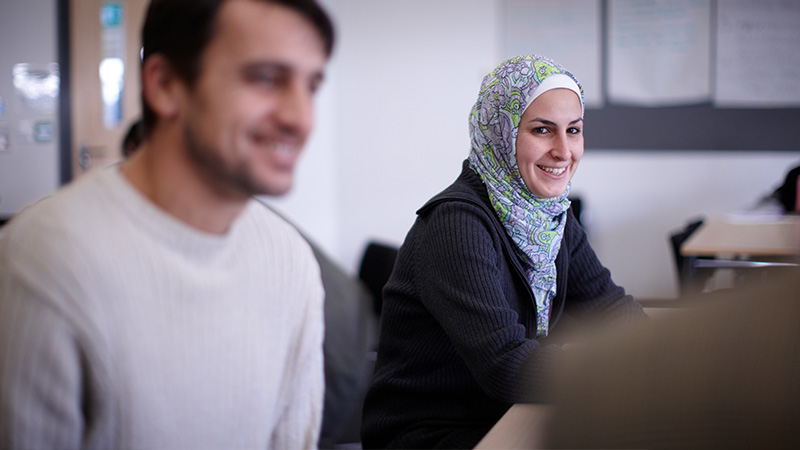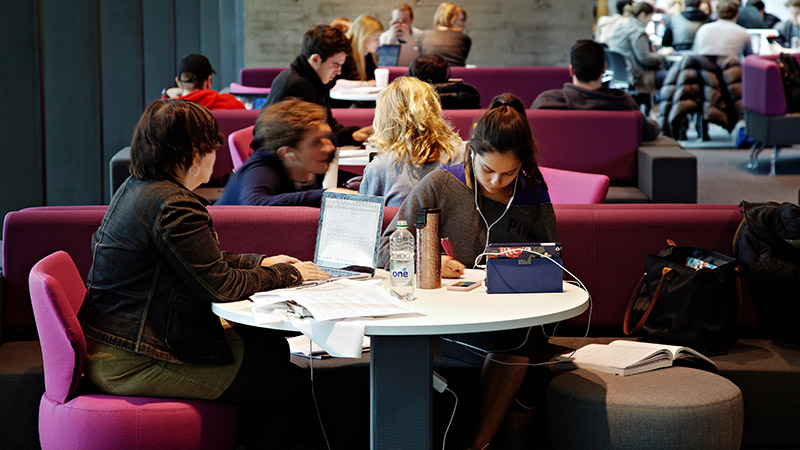Education - Teaching Multilingual Learners
PGCert
Key facts
Start dates
September 2025 / September 2026
Course length
Part time: 12 months
Overview
Our Teaching Multilingual Learners course is designed to help you provide an effective and supportive learning environment for children who are learning a second language.
You'll have the opportunity to network with other practitioners who specialise in teaching English as an additional language. And you'll gain the knowledge and skills to make informed decisions about:
- the learning and development of a child learning English as an additional language
- best practice pedagogy and policies to support them.
Our teaching staff are an experienced team who deliver the suite of TESOL courses at our School of Education, Humanities and Languages.
Our School of Education, Humanities and Languages combines high quality teaching, significant research and consultancy activity. It is a focal point for lively, informed debate on education. This is achieved through close partnership with local schools and colleges. And our open seminar and lecture programmes.

How to apply
Entry requirements
Specific entry requirements
Students should normally have a first degree and relevant teaching experience in this area.
Please also see the University's general entry requirements.
English requirements for visas
If you need a student visa to enter the UK you will need to meet the UK Visas and Immigration minimum language requirements as well as the University's requirements. Find out more about English language requirements.
Pathways courses for international and EU students
We offer a range of courses to help you meet the entry requirements for your postgraduate course and also familiarise you with university life in the UK.
Take a Pre-Master's course to develop your subject knowledge, study skills and academic language level in preparation for your master's course.
If you need to improve your English language, we offer pre-sessional English language courses to help you meet the English language requirements of your chosen master’s course.
Terms and Conditions of Enrolment
When you accept our offer, you agree to the Terms and Conditions of Enrolment. You should therefore read those conditions before accepting the offer.
Application process
Tuition fees
Questions about fees?
Contact Student Finance on:
Tuition fees
Fees quoted are for the first year only. If you are studying a course that lasts longer than one year, your fees will increase each year.
The following factors will be taken into account by the University when it is setting the annual fees: inflationary measures such as the retail price indices, projected increases in University costs, changes in the level of funding received from Government sources, admissions statistics and access considerations including the availability of student support.
How and when to pay
Tuition fee instalments for the semester are due by the Monday of week 1 of each semester. Students are not liable for full fees for that semester if they leave before week 4. If the leaving date is after week 4, full fees for the semester are payable.
- For information on payment methods please see our Make a Payment page.
- For information about refunds please visit our Refund policy page
Financial support and scholarships
Additional costs
Please be aware that some courses will involve some additional costs that are not covered by your fees. Specific additional costs for this course are detailed below.
Learning and assessment
You will study three modules (60 credits) over one year. You can take these modules part time either on-campus or through distance learning.

Study modules
Please note: As our courses are reviewed regularly as part of our quality assurance framework, the modules you can choose from may vary from those shown here. The structure of the course may also mean some modules are not available to you.
Learning and teaching
You can take this course either on-campus or by distance learning.
We organise teaching on a module-credit basis. Each module involves approximately:
- 200 hours of student input
- 24 hours of staff input.
On-campus
In semesters one and two, taught modules are usually taught over eight weeks on Wednesdays 5.00pm - 8.00pm. In semester three there is an independent study module with tutorials.
Distance learning
This involves part-time online learning through the use of our Moodle platform. Each module usually requires about 12 hours a week plus time spent on assessment.
Assessment
Assessment methods used on this course
Your assessments will be diverse, and will support different learning styles - you’ll have a real opportunity to showcase your strengths. Your learning may be assessed by a combination of individual or group coursework, and presentations. The assessment methods chosen will be based on your learning needs, individual aims and the academic standards expected for the course.
Research
The School of Education, Humanities and Languages is a thriving centre for educational research and teacher professional development. Students on master's level programmes therefore join a large research community comprising researchers at all levels of higher education study.
We hold two major research conferences each year - the School of Education Research Conference and the EdD Colloquium. All students are invited to attend our annual Research
Seminar Series (which attracts both internal and external speakers). We also organise a number of conferences, lectures, seminars and debates, some of which have an international reach.
The School’s six research groups exist to encourage engagement in research, publication, conference presentations, seminars and workshops:
- Inclusion and Wellbeing
- Policy, Partnership and Leadership
- STEAM pedagogy and learning
- Humanistic Perspectives on Education
- Early Years
- Applied Linguistics
View all staff profiles for School of Education, Humanities and Languages
After you graduate
Career prospects
Your learning on the course may lead to better prospects for career advancement and students may change role / direction as a function of developing new understandings and skills from their work on the course.
Related courses
Programme changes:
On rare occasions we may need to make changes to our course programmes after they have been
published on the website. For more information, please visit our
changes to programmes page.
